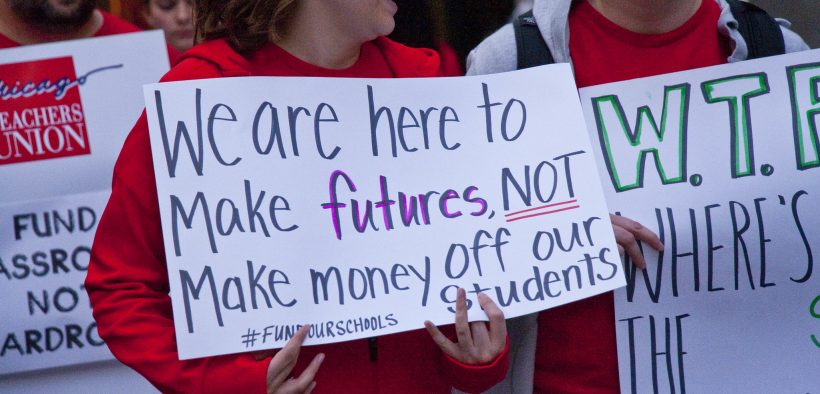Chicago Teachers Union Prepares for September Strike

“As a former CPS teacher, I know how hard our dedicated educators work to ensure the children of Chicago can live up their vast potential.”
On Monday, August 26, the Chicago Teachers Union (CTU) announced publicly that it rejected the proposed contract terms from a fact finder, or an independent party. The union is preparing for a potential strike at the end of September if the mayor and the school district fail to make an acceptable deal.
Chicago Teachers Union Rejects Contract
Before a strike can occur, the teachers must undergo a 30-day cooling off period. If the school district fails to make a deal to raise wages and increase benefits, union members will likely call for a strike as early as Sept. 26.
“As a former CPS teacher, I know how hard our dedicated educators work to ensure the children of Chicago can live up their vast potential,” CPS CEO Janice Jackson said in a press release. “Our teachers deserve a fair deal that rewards them for their service and the proposal recommendation by our independent fact finder would make that happen.”
CTU President Jesse Sharkey emphasized the need for increased wages and better benefits for Chicago’s school staff. “Though the wage and benefits will be said to be generous by the mayor and CPS team, they come in the context of nearly a decade of austerity and cuts for Chicago’s teachers and other school staff,” Sharkey told reporters Monday morning. “We have endured three freezes … and layoffs and other cuts, including cuts to our benefits, which makes conditions in the Chicago Public Schools, for the people who do the work in those schools, extremely difficult.”
Mayor Lightfoot Addresses Chicago’s Budget Deficit
Attorney Steven Bierig, acting as the strike’s neutral fact-finder, recommended a five-year contract with a 3% raise each year for three years compared to Mayor Lori Lightfoot’s suggested 2.5% per year for three years.
Bierig also suggested a 3.5% raise each year in the remaining two years of the contract in contrast with the mayor’s proposed 3%.
“This would represent the largest and most robust salary and benefit package in CTU history,” Chicago Mayor Lori Lightfoot said in an address Monday morning.
Sharkey, however, made it clear that he disagreed with the mayor’s reasoning. “We are talking about schools that saw $30 to $40 million in cuts to special education alone over the last couple of years,” Sharkey explained. “So the mayor can put a big number on it by projecting this budget out over the next five or even 10 years, but those numbers don’t fool us. We want to see immediate improvements coming in the form of increased spending on critical positions.”
CTU President Sharkey’s Response to the Mayor’s Address
After Mayor Lightfoot’s public address, Sharkey responded in a news release on Thursday:
CTU has long recognized the challenges that the City of Chicago faces. For eight years, we laid out in extensive detail the shortcomings in the previous mayor’s management strategy for our city and our schools. Like the CPS budget passed yesterday, however, that legacy has become the current administration’s policy on the City side, as well. The only way to do what Mayor Lightfoot proposes for Chicago’s working class neighborhoods is to raise revenue from those who have reaped all of the benefits of Chicago’s new economy. The deficit claimed here is less than 0.2% of the City’s economy. The money is there, and the administration should choose to use it for the common good.
Sharkey’s Proposal to the City of Chicago
Sharkey continued in Thursday’s news release:
Tomorrow, the City should:
- Declare a $400 million TIF surplus: $200 million to CPS (double the budgeted amount) and $100 million to the city without one more dollar from the City’s taxpayers. TIF policy should also be revised to impose hard guarantees on hiring from high unemployment neighborhoods and stiff claw-backs for goals not met.
- $100 million corporate head tax from companies that are reaping the benefits of Trump’s gigantic federal tax breaks. Corporate Chicago is, by every measure, vastly better off than it was eight years ago.
“The best way to grow the City,” Sharkey continued, “is to ensure that people have what they need: good paying jobs now, not two years from now; stable, well-resourced schools with appropriate supports; accessible and affordable housing; appropriate physical and mental healthcare; and public safety that doesn’t include the constant threat of abusive policing.”
According to the union, negotiations are underway, and progress is being made. The final outcome of the negotiations remains to be seen.







